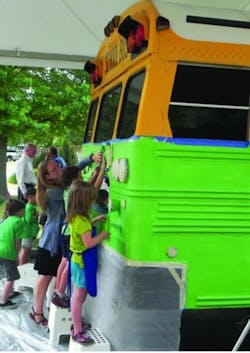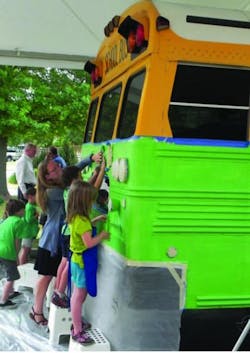Hydraulic hybrid drivetrain gets on the school bus
Anyone who's read my blog or even some of the articles I've authored over the years knows that hydraulic hybrids are one of my favorite topics. Mostly because as a non-engineer, I can truly grasp how hydraulic hybrid drivetrains work and I can truly see their benefits in the real world. I see a hydraulic hybrid drivetrain as much more useful, efficient, and cost-effective than a battery/electric hybrid ever well be.
In fact, my husband proved my point last night when he told me about a woman who was donating her electric-hybrid car because the battery had finally died (which they all do) and to replace the battery would cost her $7000! Yikes. That right there is the main reason I would never own such a car. The dealers don't tell you that the batteries won't last forever and when they do finally die, you'd be better off buying a new car.
So once again, I feel a bit of joy reporting on yet another great research project from the Center for Compact & Efficient Fluid Power (CCEFP) university Georgia Institute of Technology, where undergraduate and graduate engineering students led by Dr. Michael Leamy have developed a hydraulic hybrid retrofit of a school bus. A release yesterday from the CCEFP said the project is yielding impressive results. Not only is their work realizing the potential of new fuel efficiencies for school buses everywhere, but it also provides a model for effectively engaging college and pre-college students in hands-on learning about eco-friendly fluid power.
The rest of the news release is below but it's just a great story all-around. Helping kids and helping students learn about the power and efficiency of hydraulics in a real-life way. These are the kinds of stories I love to write about!
Over the last two years, Dr. Leamy and his students have designed, built and have begun testing a hydraulic hybrid propulsion system retrofit and biofuel conversion of a public school bus donated by the Atlanta Public Schools. Much of the design and fabrication work to date has been carried out by undergraduates in Georgia Tech’s mechanical engineering program; ME graduate students have taken on leadership roles in the project.
Their work, originally funded by grant from the Ford Motor Co. Fund, has been further enabled through donations of components as well as guidance from engineers at Eaton Corp., Evonik RohMax, Linde Corp. and Poclain Hydraulics, all industry affiliate members of CCEFP. The CCEFP will provide funding for work during the project’s third year.
School buses are ideal for hydraulic hybrid power due to their large mass and typically stop-and-go drive cycles. The hydraulic retrofit captures braking energy using a pump-motor which first pumps hydraulic fluid into a high pressure accumulator (thereby storing energy), and then releases this energy to the drivetrain through the motoring capability of the pump-motor. A microcontroller-based system developed at Georgia Tech controls the mode of operation of the pump-motor, its displacement and various valve components. Next steps involve incorporating complementary technologies including a clean start technology in which the diesel engine is shut down at bus stops and restarted using a hydraulic motor, saving children’s lungs from harmful emissions.
The hybrid retrofit has moved from the lab to the street, and tests are underway aimed at verifying predicted gains of over 20% in fuel economy. Considering that more than 700,000 gal of diesel fuel are used by school buses each year in Atlanta alone, a 20% gain in efficiency could significantly lower both fuel costs and emissions through widespread adoption.
The impact of the project’s education and outreach efforts grows, too, as more undergraduates and graduate students get involved, some even taking on the role of teacher as they use the bus to show precollege students not only how hydraulic systems operate but also why the work of engineers is so important.
Email Dr. Leamy at [email protected] or Dr. Kim Stelson, CCEFP Director at [email protected] for more details.
About the Author
Mary Gannon
Sr. Associate Editor

Leaders relevant to this article:

